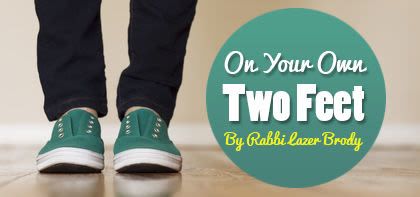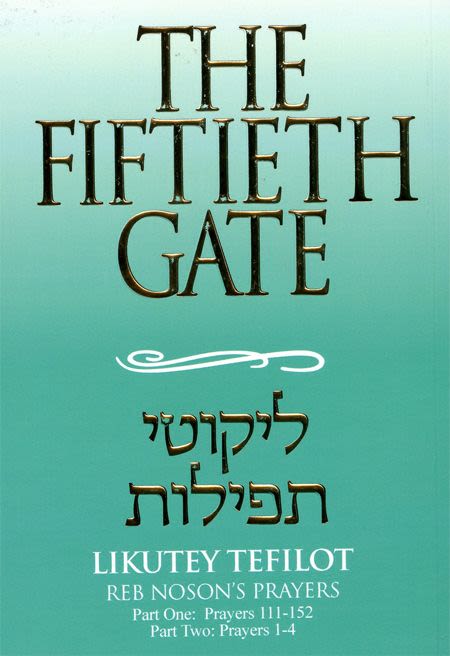
Behar: On Your Own Two Feet
Independence, both financial and emotional, is the greatest feeling; it enables a person to find truth, for he doesn't have to flatter or impress people...

"You shall strengthen him…"(Leviticus 25:35).
One of the Torah's most important commandments is to help a person in need. What's the best way to accomplish this priceless mitzva?
Rebbe Nachman of Breslev teaches that if a person is dependent on others in any way, he becomes "needy". It doesn't matter what he needs, but if he can't manage on his own, he's vulnerable to lies. Whether a person needs help in income or whether he needs a compliment from someone to make him feel good, he loses his independence to the degree that he relies on others. Those who rely on others in any way are liable to veer from the truth in order to impress those whom they rely on. Rebbe Nachman explains that this phenomenon of veering from the truth affects a person's praying; sometimes he does all types of gestures to impress others and to show them how righteous and fervent he is. Such a person is likely fishing for prestige or for financial aid, but since his gestures are intended for the other congregants and not for Hashem, they're far from the truth and so is he (see Likutei Moharan I:66).
Independence, both financial and emotional, is the greatest feeling in the world. What's more, it enables a person to find the truth. He doesn't have to flatter or impress people because he doesn't turn to flesh-and-blood for favors. He doesn't need compliments or a handout. If he wants something, or even if he needs encouragement, he turns to Hashem. A person with emuna can stand on his own two feet. In effect, we all have nothing. But since we turn to Hashem, we gain a wonderful independence of flesh-and-blood, for we're not trying to find favor in other people's eyes all the time. We can pursue the truth, wherever it takes us.
Independence is one thing, but cruelty is another. Each one of us must strive to be independent, but when we see someone else who needs help, we must readily perform our obligation to Hashem and to His Torah and  do what we can to assist the needy individual. What's more, if the needy person is a righteous convert, a widow or an orphan, helping them fulfills an additional mitzva and becomes doubly priceless.
do what we can to assist the needy individual. What's more, if the needy person is a righteous convert, a widow or an orphan, helping them fulfills an additional mitzva and becomes doubly priceless.
Rashi's classic parable tells about a man with a donkey, carrying a tremendous load on its back. The load is starting to teeter; at this point, one person is sufficient to straighten the load. But, if the load falls to the ground, four people won't be able to lift it up. Frequently, one helping hand to a wavering individual can prevent four helping hands if he falls entirely, Heaven forbid.
According to Jewish Law, there are eight levels of charity, each higher than one another. The highest level is to "strengthen the hand of a falling person…by finding him a job so that he won't be dependent on other people, for this is what is said, 'and you shall strengthen him'" (Shulchan Oruch, Yora Dea 249:6). This is the loftiest charity of all, for by finding a person employment or by teaching him a trade or skill that enables him to support himself, the benefactor enables the needy individual to stand on his own two feet. With emotional and financial independence, he is spared the humiliation of sticking his hand out to others or turning to flesh-and-blood for favors. Indeed, as an independent, the once-needy person will hopefully attain such a status that enables him to help others.
Strengthening a person emotionally and spiritually is just as much a mitzva as strengthening him financially. When one person teaches someone else to talk to Hashem every day and to turn to Him for – that there's no need (and no use) to run after others for whatever he is seeking – he helps that person become independent, for the latter will no longer be dependent on other people, neither financially nor emotionally. Teaching a person to stand on his own two feet and to talk to Hashem every day Is no less important than finding him a job or teaching him a trade, for by speaking to Hashem every day, he'll see with his own two eyes how he becomes independent of flesh-and-blood in every aspect of his life. He is now free to find truth, for he doesn't have to flatter or impress a single person on earth.












5/09/2014
Good Quality Article Rabbi you hit it on the button again with this article and your shiur on Feeling the Pinch both were very good needed down to earth stuff.Thanks
5/09/2014
Rabbi you hit it on the button again with this article and your shiur on Feeling the Pinch both were very good needed down to earth stuff.Thanks